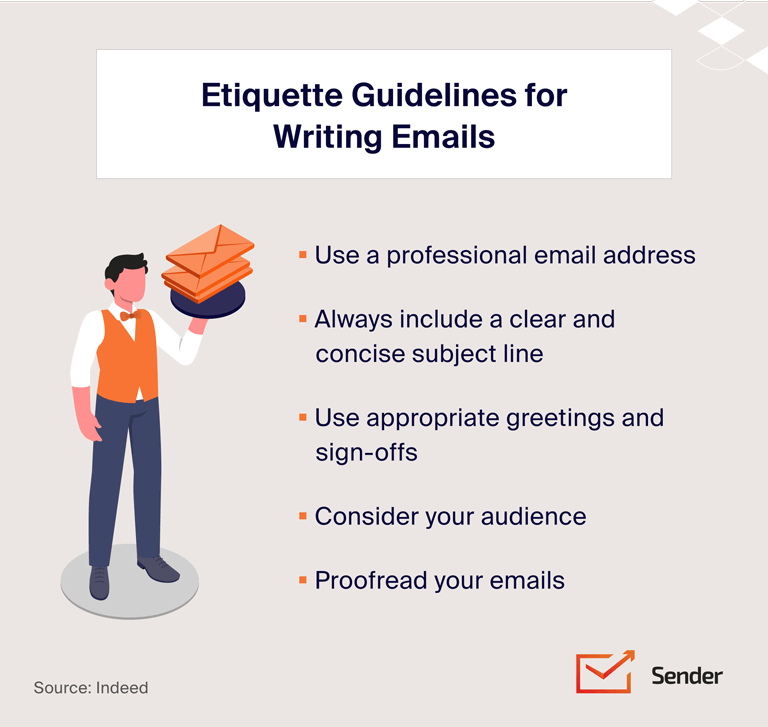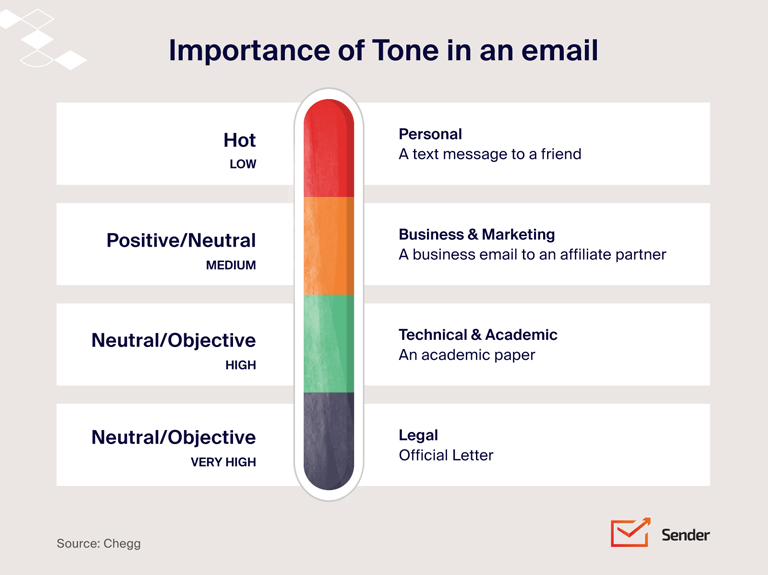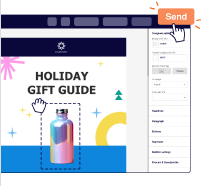Ever typed “YOLO” when “Regards” would’ve been the better choice?
Been there! Tiptoeing through the maze of professional email etiquette can sometimes feel like wearing clown shoes in a boardroom meeting.
But here’s the good news: those faux pas moments aren’t a life sentence. We’ve crafted the ultimate guide that’s about to sprinkle some finesse on your email game.
From crafting the perfect subject line to nailing that closing sign-off, we’re turning those “Oops, wrong recipient!” moments into well-crafted masterpieces.
Ready to embark on this email makeover? Dive in with us!
The Basics of Email Etiquette for Professionals
Diving into the world of professional email etiquette is like setting the foundation for all your digital interactions.
Think of it as the unwritten rulebook that guides how you present yourself in the online business realm. Having a grasp on email etiquette for professionals ensures you’re always on point, whether you’re addressing superiors, coordinating with peers, or guiding subordinates.
It’s not just about saying the right thing; it’s about conveying your message clearly and maintaining the professionalism of email that we all aim for.
By following the basic email etiquette, you’ll avoid those cringe-worthy email blunders, ensuring every send button click leaves a positive impression. And remember, it’s not just about your email content; things like your subject line and email addressing etiquette play a pivotal role too.
So, whether you’re sending a quick update or a detailed proposal, always have your email etiquette in business at the forefront of your mind. It’s the key to making sure you’re always seen in the best light.

1. Know Your Recipient
Before hitting the keyboard, invest a few moments to get to know the person you’re about to email. To successfully understand your recipient:
- Research their position: Determine their role within the organization. Is the person a senior executive who prefers formal communication, a peer who might appreciate a more casual tone, or perhaps someone from a different department with whom you’ll want to be more informative?
- Review past interactions: Revisit previous email exchanges or meetings to gauge the tone and nature of your relationship. This can offer cues on how to approach the current conversation;
- Understand their background: If possible, a quick LinkedIn or company website search can shed light on their professional background and achievements, helping you address them more effectively.
Equipped with this knowledge, you’ll be poised to tailor your email’s tone, content, and level of formality to best resonate with your recipient.
Such a tailored approach not only ensures clearer communication but also builds rapport, reinforcing a connection that aligns with both your and your recipient’s expectations.
Pro tip: Always ensure that you are using a personalized email address like yourname@yourdomain.com, offered by a reputable email hosting provider. This will help you get a better open rate and deliverability.
2. Subject Line Matters
The subject line acts as the gateway to your email. A compelling, clear, and concise subject line increases the chances of your email being opened promptly. It should provide a snapshot of the email’s content, prompting the recipient to delve deeper.
For a subject line that stands out:
- Be specific: Clarity trumps creativity. Ensure your subject clearly indicates the email’s purpose or content. For instance, “Meeting Agenda for April 10th” is direct and to the point;
- Keep it short: Ideally, your subject line should be under 50 characters so it displays fully in most email clients;
- Avoid clickbait: Sensationalized or misleading subject lines might get initial clicks, but they erode trust in the long run;
- Prioritize urgency when needed: If immediate attention is required, start with words like “Urgent” or “Important”, but use them judiciously to maintain their weight.
Your subject line is often the first impression you make. A well-constructed one not only ensures your email gets opened but also sets the tone for your message, making it less likely to be lost in the shuffle or disregarded.
3. Addressing with Respect
The first few words of your email lay the foundation for the communication that follows. To ensure you start on the right foot:
- Match the relationship. If you have a close relationship with the recipient, a casual greeting like “Hi Alex” may be fitting. But for professional contacts or those you’re less familiar with, a formal “Dear Dr. Smith” or “Hello Ms. Johnson” may be more appropriate;
- Do your research. If you’re unsure about the recipient’s title or name, a quick look at their company website, LinkedIn, or previous email interactions can help. It’s always better to be slightly more formal than too casual;
- Avoid generic openings. Overused greetings like “To Whom It May Concern” can be impersonal. Personalize your salutation whenever possible;
- Consider cultural differences. When communicating with people from other cultures, it’s essential to be aware of their preferred greetings and titles. What’s casual in one culture may be deemed disrespectful in another.
Your greeting sets the tone for the rest of the email. By ensuring it’s both respectful and tailored to the recipient, you pave the way for a positive and effective interaction.
4. Content is King
In today’s fast-paced business world, professionals are often inundated with a constant stream of emails. Given this deluge, brevity isn’t just appreciated—it’s essential. Here’s how you can create an email that’s both concise and impactful:
- Get straight to the point: Begin with the most crucial information. This ensures that the recipient will grasp the primary message even if they skim the email;
- Avoid ambiguity: Strive for clarity in every sentence. Eschew industry jargon, buzzwords, or overly complex structures that might confuse the reader;
- Use structure wisely: Breaking your content into bullet points or short, distinct paragraphs can greatly improve readability. This format not only looks cleaner but also allows readers to quickly identify the main ideas. Utilizing an AI paragraph generator to assist in this process can streamline content creation;
- Highlight key information: Use bold or italics (sparingly) to emphasize crucial points, ensuring they don’t get lost in the text.
Crafting your email with precision and a reader-friendly structure ensures that your message is both understood and acted upon, even in the busiest of inboxes.
5. Understanding the Importance of Tone
In the realm of emails, where facial expressions and vocal cues are absent, the tone of your words takes center stage. Misunderstandings can easily arise if the language used doesn’t clearly convey the intended sentiment.
A casual chat with a colleague might benefit from a friendly, relaxed tone filled with warmth and approachability. On the other hand, official notifications or critical business decisions necessitate a formal tone marked by directness and clarity.
When sending invoices to customers, it’s of paramount importance to maintain a polite and respectful tone. This not only reinforces professionalism but also fosters a positive relationship with your clients, promoting prompt and reliable payments while preserving the integrity of your business.

Mastering tone in emails is about reading the room—understanding the situation, knowing your audience, and choosing words that align with both the message’s gravity and the recipient’s expectations.
6. The Do’s and Don’ts of Attachments
Attachments are more than just files—they’re an integral component of your email communication. When sending them:
Do’s:
- Ensure relevance: Only attach files that are pertinent to the email’s subject or context;
- Rename for clarity: Adjust file names so the recipient can quickly gauge the content;
- Run a malware scan: Before attaching, ensure your file is virus-free to maintain both your and the recipient’s digital safety;
- Describe in the email: Provide a brief description within the email body about the attachment, highlighting its significance.
Don’ts:
- Overwhelm with files: Refrain from attaching excessive or large files without prior notice;
- Neglect file formats: Always consider if the recipient can open the file type you’re sending;
- Forget to double-check: Ensure you’ve attached the correct file, especially when discussing sensitive information.
By adhering to these guidelines, you’ll ensure your attachments enhance rather than hinder effective email communication.
7. Proper Closing and Signature
Your email’s closing creates a final impression. Depending on the tone and context of your email, a formal “Regards” or a laid-back “Cheers” can be apt. It’s about finding the right balance that aligns with the content and audience of your message.
Right after your closing, your signature steps in as your digital identifier. Think of it as an online business card: it prominently displays your name, followed by your role, company, and contact details.
This section should be up-to-date and consistent across all your emails. A well-crafted professional signature not only reinforces your professionalism but also offers an easy reference for those looking to reach out.
Choosing a Closing
| Professional | Semi professional | Avoid |
| Best | Cheers | See ya later |
| Best regards | Warmly | Love |
| Kind regards | Thanks | XO |
| Regards | Thanks in advance | Bye |
| Sincerely | Best wishes | Ciao |
| With gratitude |
8. The Art of Responsiveness
In the fast-paced world of digital communication, timely replies are more than just a courtesy—they’re a reflection of your dedication and professionalism. When you promptly respond to an email, it sends a clear message that you value the sender’s input and are actively engaged in the conversation.
But, there will be times when crafting a detailed response might take a while, especially if the matter is complex or requires additional research. In such situations, it’s beneficial to send a brief acknowledgement email.
A simple note indicating that you’ve received their message and will reply with a detailed reply shortly can work wonders. This gesture not only assures the sender that their message hasn’t fallen through the cracks but also fosters an environment of mutual respect and open dialogue.
In essence, it’s about maintaining the rhythm of communication and showing that you’re always tuned in.
9. State Urgency When Needed
When an email topic is urgent and requires prompt attention, it’s crucial to communicate its urgency. However, this needs to be done clearly and tactfully.
While technology provides tools like urgency flags to highlight such emails, the responsibility of using them judiciously falls squarely on the sender.
Overuse or misuse of urgency indicators can have unintended consequences. If every other email is flagged as urgent, recipients might start overlooking them, leading to a potential “boy who cried wolf” scenario. Consequently, the truly urgent matters might get lost in the shuffle.
Thus, proper email etiquette for professionals not only endorses clear communication of urgency but also underscores its restrained use.
By reserving urgency markers for genuinely critical matters, you ensure that when the situation truly demands it, your call for prompt action will be both heard and heeded.
Frequently Asked Questions
We know diving into the world of email professionalism can leave you with a slew of questions. You’re not alone; many have queries about professional email etiquette. Let’s address some of the questions we haven’t touched on yet.
How do I manage the CC and BCC fields with email etiquette in mind?
Ah, the age-old CC (carbon copy) and BCC (blind carbon copy) conundrum! When you CC someone, it’s like giving them a heads-up or keeping them in the loop. Be mindful, though. Only include individuals who truly need to be aware of the information.
BCC, on the other hand, is a bit more discreet. Use it when you’re sharing information with a large group and want to protect everyone’s email privacy. Essentially, it’s a way to uphold email manners without flooding someone’s inbox or disclosing addresses.
How often should I follow up if I don’t get a response?
Patience is key, but so is persistence. If your first email doesn’t garner a response within a week, send a gentle reminder. After that, give it another week. If you still hear crickets, it might be worth one final nudge.
But always remember: email etiquette for business stresses the importance of not being overly persistent to the point of annoyance.
What’s the deal with emojis in professional emails?
Emojis can be a fun way to express emotion in casual chats, but when it comes to professional email etiquette, tread carefully. Including the occasional smiley in emails to colleagues you’re close with can add warmth.
However, for more formal interactions, especially with superiors or external contacts, it’s best to keep the emojis at bay. Stick to words to convey your sentiments and maintain that professional email demeanor.
Key Takeaways on Professional Email Etiquettes
We’ve journeyed through the intricacies of professional email etiquette, underscoring that it’s not merely about content but also presentation.
It’s essential to personalize and understand the dynamics when knowing your recipient. Your subject line is your email’s inviting entrance. Addressing and content are foundational pillars ensuring that strong first impression.
We explored the subtleties of maintaining the right tone, the art of handling attachments, concluding emails gracefully, prompt responsiveness, and appropriately highlighting email urgencies.
Those hot topics of CCs, follow-ups, and emojis also found their spotlight. At its core, stellar email etiquette orbits around mutual respect, clear communication, and authenticity.
So, the next time you craft an email, keep these insights handy. Here’s to your ascent in the realm of email mastery!





